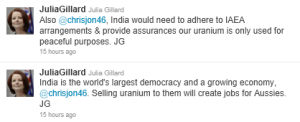Uranium mining is a particularly divisive topic in Australia. It was only ten years ago that news headlines were dominated by those protesting the development of a uranium mine at Jabiluka in the Northern Territory. However, yesterday, the Australian discourse surrounding uranium took an unexpected detour, with Prime Minister Julia Gillard openly courting the idea of selling uranium to India.
While Australia has been selling uranium to other states for some time, the significance of this move is that the Prime Minister is considering selling Australian uranium to a state who is not a signatory to the Nuclear Non-Proliferation Treaty (NPT).
For those not in the know, the NPT is the primary international agreement that seeks to control the sale of materials between states in an effort to prevent the spread of nuclear weapons. True, it is lopsided, with non-nuclear weapon states (the vast majority) being prevented from developing nuclear weapons, while nuclear weapon states are obliged to pursue disarmament (though with no strict timetable). However, the agreement permits the trade of nuclear material between signatories for non-weapons ‘safe’ purposes such as energy.
However, India, along with Pakistan and Israel, are non-signatories, and therefore theoretically prevented from purchasing nuclear materials from states within the NPT regime. The first two are confirmed nuclear powers. Furthermore, India is not (yet) a member of the Nuclear Suppliers Group, which places further exports control on the trade of nuclear material between signatories, which goes beyond the NPT.
I must confess that this sudden change in foreign policy is somewhat disturbing, arguably undermining Australia’s disarmament credentials, increasing tensions between nuclear powers in the region, all in favour of short-term domestic economic gains. It is true that other states signatories to the NPT, such as the United States, have opened up bilateral channels with India and have actively traded in nuclear technology with India over the past few years. However, I find this fact to be a less than convincing justification for an act that sets a dangerous precedent for Australia, a country that sits within a region with growing security concerns. I love India and I love Indians, but the ongoing friction between Pakistan and India, both armed with nuclear weapons, means that the possibility of nuclear exchange is a definite reality. This is something that might not be evident to Aussie Joe citizen given our relative isolation in the South Pacific.
Furthermore, if we’re going to sell to India, why don’t we also sell to Pakistan? Does it even open the possibility of selling to North Korea? Does it legitimise other countries with fewer scruples from supplying other states with nuclear material that could be used in nuclear weapons? Considering the worries over Iran’s clandestine nuclear program, the Prime Minister’s position on uranium sale should be thoroughly scrutinised, with its wider possible international implications teased out.
Some tweets from the PM yesterday, which sought to reassure concerned Australians about the safeguards, also seemed flimsy. She stated that India was the world’s largest democracy, inferring that this somehow acted as a safeguard. History shows otherwise, Julia. The only state to use a nuclear weapon in war was a democracy. Moreover, it is true that sections of the US politic recommended using strategic nuclear weapons against the VietCong during the Vietnam War. Democracy does not mean a nuclear muzzle.
It’s only the start of the debate, and I really need to learn more about the nuts and bolts of the proposed policy if it does eventuate. The Interpreter has an interesting piece arguing the other way, that selling uranium to India will actually bring Australia closer to the subcontinent. Still, there are risks, and the government need to explain the safeguards in detail to assure sceptics like myself.
Some closing questions that are of interest. Will the proposed sale of uranium to India harm Australia’s bid for a non-permanent seat on the UN Security Council? And how will this affect Australia’s relationship with Pakistan? Will it damage Australia’s disarmament creditials? How will China react? All pertinent questions that could be impacted by this new foreign policy angle.


Leave a Reply
You must be logged in to post a comment.